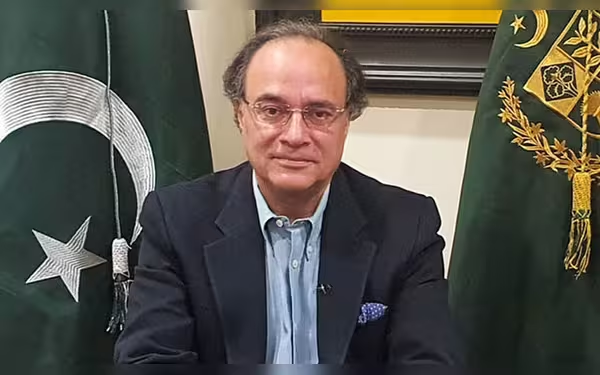Monday, December 23, 2024 12:15 AM
Pakistan Economy Recovery Under Finance Minister Aurangzeb's Prudent Policies
- Inflation drops from 38% to 7% under new policies.
- Foreign exchange reserves increase to 2.5 months of import cover.
- Government committed to expanding the tax net for sustainable growth.
 Image Credits: dailytimes_pk
Image Credits: dailytimes_pkFinance Minister Aurangzeb announces significant economic recovery in Pakistan through prudent policies, reducing inflation and improving reserves.
The economy of Pakistan has been a topic of concern for many years, with various challenges affecting its growth and stability. However, recent statements from Finance Minister Muhammad Aurangzeb suggest that the country is on a path to recovery, thanks to what he describes as "prudent economic policies." These policies have reportedly led to significant improvements in key economic indicators, including inflation rates and foreign exchange reserves.
During a media briefing in Islamabad, Aurangzeb highlighted the positive changes in the economy, noting that inflation has decreased from a staggering 38 percent to just 7 percent. Additionally, the policy interest rate has been reduced from 22 percent to 15 percent. This reduction in inflation and interest rates is a welcome relief for many citizens who have been struggling with rising costs. Furthermore, the foreign exchange reserves have improved, increasing from a mere two weeks of import cover to a more stable 2.5 months of import cover. These figures indicate a more secure economic environment, which is crucial for both local and foreign investors.
In his discussions with various multilateral institutions during his recent visit to Washington DC, Aurangzeb received commendations from the international community, financial institutions, and rating agencies for the government's efforts in steering the economy from deficits to surpluses. He engaged with representatives from countries such as the United Arab Emirates, Saudi Arabia, China, and Turkiye, as well as officials from the US treasury. This international dialogue is essential for building trust and credibility, which can lead to further investment and support for Pakistan's economy.
Moreover, the Finance Minister addressed the ongoing discussions with the International Monetary Fund (IMF), emphasizing the importance of these interactions for mutual credibility. The recent visit by the IMF delegation to Pakistan focused on energy reforms, state-owned enterprise (SOE) reforms, and the privatization agenda. Aurangzeb stated that the government is committed to "rightsizing" the federal government, which is a crucial step towards improving fiscal responsibility.
On the topic of revenue and taxation, Aurangzeb acknowledged the burden on the salaried class, stating that increasing taxes is not a viable solution. Instead, he emphasized the need to expand the tax net to include more individuals and businesses. He pointed out that "countries do not and cannot run on charity or donations," highlighting the necessity of a robust tax system to sustain long-term economic growth. However, he also recognized that many segments of society are already overtaxed, indicating a need for a balanced approach to taxation.
In addition to economic reforms, Aurangzeb stressed the importance of addressing existential issues such as "unchecked population growth and the climate emergency." He called for a comprehensive approach that treats these challenges with the same urgency as economic recovery. The Finance Minister's remarks serve as a reminder that while economic stability is crucial, it must be pursued alongside social and environmental responsibilities.
The statements made by Finance Minister Muhammad Aurangzeb reflect a cautious optimism regarding Pakistan's economic future. The government's commitment to prudent policies, international collaboration, and addressing pressing social issues could pave the way for a more stable and prosperous economy. As the country navigates these challenges, it is essential for all stakeholders to work together to ensure sustainable growth that benefits all citizens.













